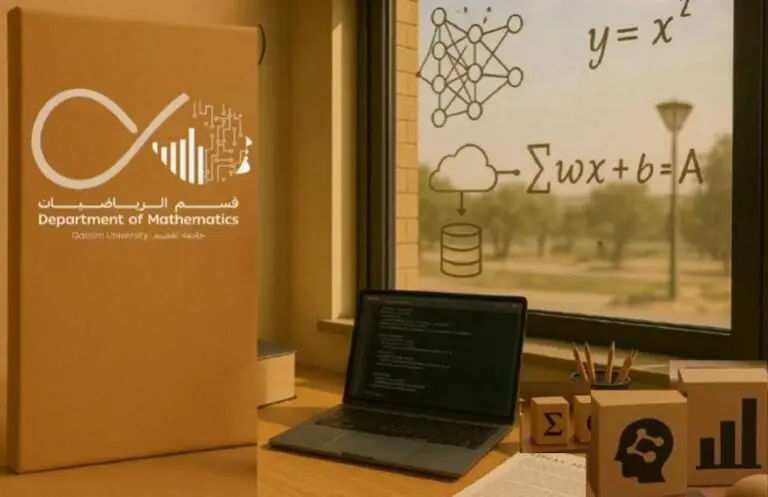Mathematics department

Head of Department:
Dr.. Dr. Saleh bin Fahad Al-Jarboua
Office :
Buraidah - Qassim University (Main Building): A4-L2-R-3193
Phone number :
12588
e-mail:
Cos.math@qu.edu.sa
Vision
Excellence in the field of mathematics and its applications, contributing to the promotion of sustainable local development.
Mission Statement
Providing a distinguished educational and research service for the bachelor's and master's levels in the field of mathematics, giving them the opportunity to compete in the era of globalization to meet the needs of society while preserving Islamic values.
An Overview
The Department of Mathematics was established in 1418 A.H. coinciding with the establishment of the College of Science in Al-Qassim. The department has developed rapidly over the past few years with the increase in the number of faculty members and the increase in the number of students of the department, and the department teaches mathematics courses to the students of the Department of Mathematics and all students of other departments in the faculties of the university. The department has recently introduced new programs such as the Bachelor of Science in Actuarial Mathematics and the Master of Science in Applied Mathematics, thus, the department includes the Bachelor of Science in Mathematics and Actuarial Mathematics and the Master of Science in Pure and Applied Mathematics programs. The department also has a number of administrative and academic committees, including the Quality and Academic Accreditation Committee and the Study Plans Committee, which are concerned with the procedures of continuous development, academic accreditation, and program development. The Bachelor of Mathematics and Master of Pure Mathematics programs have received full programmatic accreditation from the National Center for Academic Accreditation and Assessment (NCAAA). He also provides statistical advice for applied research projects inside and outside the college, whether at the research design stage or at the stage of data analysis and interpretation of results. He also contributes
Objectives :
1- Developing study plans in line with the requirements of preparing graduates with knowledgeable skills to serve the community
Local.
2- Graduating scientific and practical competencies to fill specialized jobs in the public and private sectors.
3- Promoting scientific research in the field of mathematics, studying mathematical problems and conducting scientific research to find
Appropriate solutions and participation in national and international conferences.
4- Providing students with the concepts, principles, and theories of mathematics and statistics.
5- Ensuring that there is a continuous, adequate and serious updating of knowledge related to contemporary mathematical and statistical topics.
6- Spreading the culture of teamwork among students and the need to adapt to change
7- Shifting towards e-learning and supporting modern technologies.
